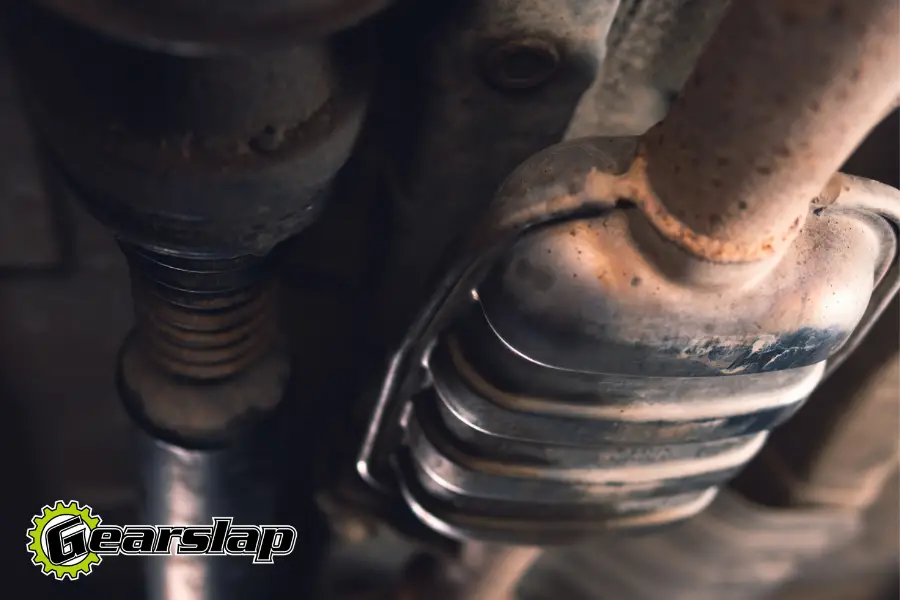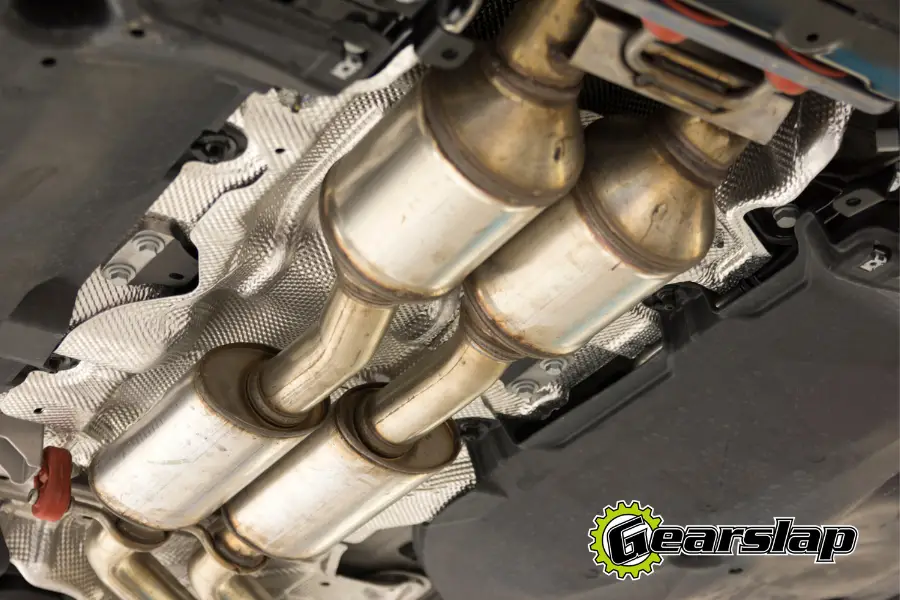Your vehicle exhaust system is responsible for converting the toxic gases from the internal combustion process into less harmful gases released in the air. So, if there’s a leakage, you may wonder, how important is it to fix an exhaust leak?
Well, exhaust leakages can cause toxic gas produced from the internal combustion process to find its way inside your vehicle. Such gases are poisonous and can cause headaches and dizziness.
That said, if your greatest concern is: what are the symptoms of exhaust leaks? I will share a few tips on how to tell if you have an exhaust leak.
Tale-Tell Signs There’s a Leak in Your Exhaust System
There are different ways you can tell when you have an exhaust leak. Here are a few you should know.
A Loud Noise Coming from Around the Engine
You could be thinking, does an exhaust leak make your car loud? The answer is yes!
Your vehicle’s exhaust manifold is what connects your engine to the entire exhaust system. Over time, the manifold can develop structural stress due to high temperature and begin to develop cracks.
When these cracks extend to the edge of your car gasket, they will cause an exhaust leak. When this happens, you’ll start to hear popping noises beneath your hood.
However, you should note that loud engine noises could result from different issues like incorrect engine compression, dirty fuel injection, or faulty belts. So, it’s crucial to contact a technician to check out whether that’s the cause of your problem.
Your Gas Pedal Is Vibrating
When there is a leak within your exhaust system, it can cause your vehicle to vibrate. If you don’t take action, you’ll start to feel the vibration on the steering wheel and gas pedal.
In cases where there are larger holes in your exhaust, you’ll experience even harsher vibrations inside the car.
You May Have Poor Fuel Efficiency
When you have a leaking exhaust, your engine control unit will fail to get an accurate reading from your sensors on the valve’s oxygen going in or out. This results in your engine burning more fuel to compensate for this shortcoming.
This has happened to me a couple of times, and in most cases, I have noticed reduced miles per gallon translating to increased fuel costs.
Therefore, if you ever notice this issue, one of the questions you may be asking yourself is; do I really need to have that exhaust leak fixed?
Sure, it’s crucial to have the issue checked as it will help you make significant savings on your energy costs. This will also help to remove any possibility that you could be having a bad oxygen sensor.
You Can Hear Unusual Noises While Accelerating
You may think it’s normal to hear a roaring sound when you step on the gas pedal while accelerating your vehicle. This is because it’s the sound produced by your engine while generating power to push your car.
However, if you hear odd noises like whistling sounds, the chances are that there’s a leak on your exhaust system.
If you experience this problem but still wondering, are exhaust leaks worth fixing? It will help if you consider prompt repairs to avoid major problems like engine failure.
Quick action will also help rule out the possibility that your problem could result from incorrect engine assembly or dirt in the crankcase.
You Can Smell an Unusual Odor
If you notice any strange smell in your cabin as you drive, you most likely have an exhaust leak. You might be wondering, is it dangerous, and can it make you sick?
Yes, you’re probably inhaling carbon monoxide, which can be fatal if inhaled for a long time. You must have this issue handled quickly and ensure that you drive with your car windows open immediately you detect this sign.
From my experience, you can tell that you have exhaust system problems when there’s a change of smell from your exhaust.
When you notice a rotten-egg smell, it could signify that your catalytic converter is failing. When you smell gasoline in your exhaust, you could be having issues with your engine.
You’re Experiencing Loss of Horsepower
Your engine will run optimally when there’s no interruption to your exhaust flow. So, when there’s a leak within your exhaust system, it leads to a drop in the exhaust back pressure which can cause sluggish acceleration or a decrease in power.
So, when your vehicle doesn’t pick up and go as usual when you press the gas pedal, let a technician check whether your exhaust has leaks. If you don’t take any action, your vehicle will continue to lose power.
You Have Failed Emission Test
In some states, motor vehicles must perform yearly emission tests to pass the inspection. When the air leak passes through the oxygen sensor, it can cause issues with the air-fuel mixture, and the test will indicate that it’s a lean mixture, indicating a failed emission test.
Should You Drive Your Vehicle with an Exhaust Leak?
It’s not advisable to drive if you have an exhaust leak as it can make you feel sleepy, especially when you can smell a different odor in your cabin. Additionally, poor gas mileage, vibration, and noise aren’t just annoying but can significantly decrease your vehicle’s performance.
You should know that exhaust fumes and the fuel in the exhaust pipe can be ignited. So, if you have an exhaust leak in an unexpected place, it can cause your vehicle to catch fire.
Many people aren’t quick to solve their exhaust issues because they keep contemplating whether their inspection and exhaust repair will be costly.
After my experience with engine leaks, some of the auto repair shops I visited either performed an inspection free of charge or at a minimal fee. This was done before I received a final quote for my exhaust repair.
How Much Will It Cost You to Replace Your Exhaust Leak?
If it’s your first time experiencing an exhaust leak, you may be wondering, is it expensive to fix an exhaust leak?
Well, you may spend up to $1,500 to fix this issue. However, the amount you will pay will depend on different aspects like the model and make of your vehicle and the year of manufacture.
What Is the Best Way to Fix an Exhaust Leak From the Manifold?
Before you repair the leak, it’s crucial to find the source of the problem. To do this, you need to start your engine then listen for any signs of tapping sounds. It would be best to search for possible signs of an exhaust leak, like missing studs and soot stains.
The other way to find an exhaust leak is by removing the exhaust manifold and confirming whether it’s working effectively. You can do this by inspecting it for hairline cracks that may require a replacement.
If there are no visible cracks, you should check for warpage using a flashlight and precision straightedge. In case of a warp on your exhaust manifold, the light will shine under the straight edge.
How Can You Fix Your Manifold Exhaust Leak?
If you have an exhaust leak from your exhaust manifold, you can seal it by changing your gasket. The bolts can sometimes be hard to remove due to accumulated rust, which might need special attention to loosen.
Having the manifold fixed at a garage would help you avoid many hassles associated with DIY.


